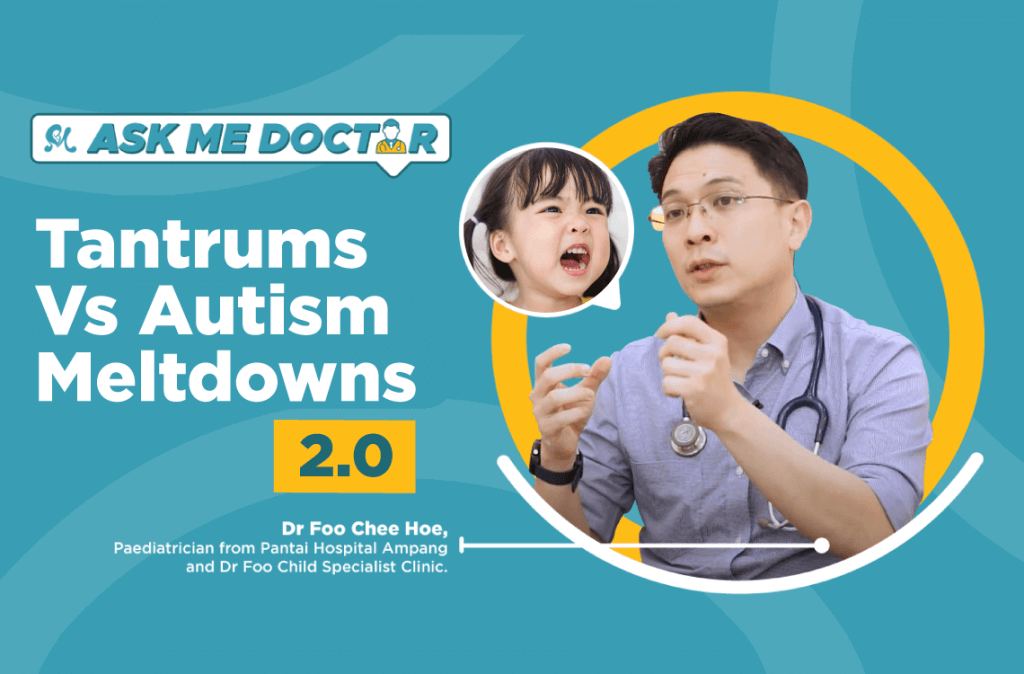Let us continue with AskMeDoctor! Episode 6, Part 2 – on Distinction Between Tantrums & Autism Meltdowns.
Similar to the first part of this episode, Dr Foo Chee Hoe, a paediatrician from Pantai Hospital Ampang and Dr Foo Child Specialist Clinic continues to answer all of your questions regarding this topic.
Q6: Is Cerebral palsy related to autism?
Dr Foo: The straight answer would be no! Autism is not directly linked to cerebral palsy. Cerebral palsy is a condition where there is damage to a developing brain.
It can be an event or something that happened just before birth, during birth or right after birth.
Usually, an infection, some incident during birth, some genetic abnormality, and the hormonal abnormality can cause brain damage.
Of course, it is possible, coincidentally, a cerebral palsy child also has features of autism.
In cerebral palsy, there is damage in the developing brain. But I wouldn’t say there is a direct link between the two.
In autistic children, studies have shown that when they do MRI scans of their brain, there are some differences in the brain structure but we do not define it as damage.
There are just some differences. In short, cerebral palsy does not cause autism.
Q7: Can autism meltdowns be treated?
Dr Foo: I think the main aim to deal with autism meltdown is, number one, prevention. A parent must be very intimate about the child’s needs and after a while, they will be experts in autism.
General paediatricians like us, are learning from the community of parents of autistic children. We are also learning from the experts, the therapists, and the developmental paediatrician.
I think the aim is more to understand your child. Know what can trigger the meltdown and avoid those meltdowns by removing those possible sensory inputs that can overload them.
If the meltdowns are happening very frequently and very difficult to contend with because sometimes compared to tantrums, autism meltdowns can last for a very long time.
So there are medications that can be used to calm them down but this would be in the professional region of the child psychiatrists and developmental paediatricians.
Usual family doctors and general paediatricians like us would not be prescribing.
The main point would be prevention.
Avoiding triggers and understanding your child so that you will know what are the best strategies to deal with and content the meltdown is the primary rule.
Q8: Will tantrums stop? And at what age?
Dr Foo: The child learns to test the limit of their parents. Sometimes, they can even start before the age of two but we always have an understanding about terrible two.
So it is true that by the age of two to three years old, this is the peak where most tantrums will occur because the child has learned and they are developing in a way emotionally, where they know tantrums may work to manipulate their parents but they are not equipped yet to fully communicate themselves.
As they develop emotionally and behaviourally, they would learn. Usually, it would taper off after four years old.
You cannot have the expectation like ‘Oh, after this, it should be no more.’
Hopefully, every time a tantrum happens, it will be an opportunity and a teaching moment for the parents to teach the child how to express themselves and how to convey their desire for something.
Q9: What can I do to prepare the future of children with autism?
Dr Foo: I think parents need to recognise that autism would be an integral part of the child’s life. It is what defines them.
So we should view it as both their strength and weakness, and we work from there.
It is very important to prepare them for society, prepare them for a life when we are no longer around to supervise them, to guide them.
We must have the belief that autistic children can be trained, can be educated and they can achieve a lot of things just like any child in the mainstream school.
So identify the strengths and work with their weaknesses. Develop them so they can acquire skills that can go through the education process where they are able to find work and contribute to society.
We must not always view special children with special needs with an OKU label.
It is just like how parents plan for the future needs of any children. The education, the financial plan and any legal matters like any will, any trust funds for them.
Lastly, we are going to train them to be functional member of society.
We must have hope and confidence in our child that they are able to achieve all this instead of just let it be and not having a plan for them in the future, especially at a time where we are no longer around.
